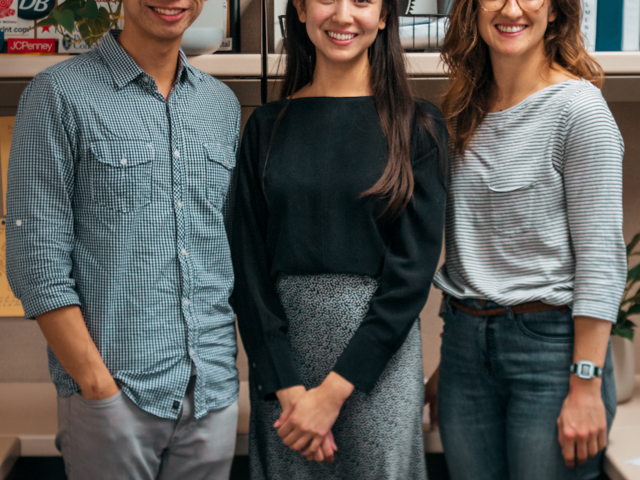Staff Spotlight Series: Rachel Tang, Census Outreach Coordinator
It’s 8:00 a.m. on a Monday morning, and Rachel Tang’s iPhone alarm alerts her that it is time to wake up. After a weekend chock-full of networking phone calls, responding to emails, and babysitting her three young cousins with whom she lives, Rachel is about to get ready for work. After cycling through her morning routine of showering, sifting through her emails, and munching on a slice of avocado toast, she checks her phone again: it’s 8:55 a.m. She realizes she’s running late, but luckily today she doesn’t have much of a commute.
Lately, work has looked a little different for Rachel, who serves as the office’s Census Outreach Coordinator. Far from close-knit cubicles, fluorescent lights, and large glass windowpanes, Rachel now finds herself coordinating volunteers for the Census Outreach Program from her home, which she shares with her aunt and her three young cousins. She explains how the IRC’s extensive and rapid adoption of technology has reconfigured how she does her job.
Rachel began working with the IRC in September 2018 as an AmeriCorps Associate, gaining valuable experience working directly with refugees, political asylees, and human trafficking victims before transitioning to her current role as Outreach Coordinator. Equal parts serious and playful, effervescent and ambitious, she is described by her coworkers as energizing and optimistic, traits she has carried with her through the transition to online services and which she has used to make light of the new normal imposed by the public health guidance surrounding the ongoing COVID-19 pandemic. Accustomed to seeing clients, interns, and volunteers report directly to the office, Rachel describes the difficulty of coordinating the office’s census outreach volunteers from her laptop.

“A lot of my work involves directing, supervising, and responding to the questions of our census outreach volunteers,” she said, “which has traditionally been done in-person, but that hasn’t been possible since the office was closed to visitors in March.”
Complicating the issue is the fact that Rachel now has to stay in touch much more often since many volunteers didn’t work in the office before it closed. Moreover, without access to IRC hardware, volunteers faced the prospect of having to make phone calls to clients on their personal devices. “That’s where Google Voice comes in,” Rachel said. Google Voice is a telephone service that allows users to get a free phone number for calls, text messages, and voicemail. With just a Google account and mobile phone with internet access, volunteers can make calls from anywhere in the U.S. without tapping their data plans and inadvertently providing their personal contact information to clients. “The main reason I wanted to use Google Voice is because I didn’t want volunteers to be bothered during off-hours,” Rachel said. “Plus, the tool gives them the flexibility to choose their hours, which is important since they’ll be working on their own remotely.”
According to Rachel, increasing reliance on technology has been among the biggest changes — and most powerful solutions — experienced by the organization’s affiliates. “[The IRC staff] used to meet just once a month— now using Microsoft Teams as our communication platform, we meet twice a week and I feel almost as connected and supported now as I did when I worked in the office.”
Rachel’s story is just one of a compendium of employee, intern, and volunteer narratives that underscore the creative resilience of the IRC and its associates in the face of COVID-19. Confronting the spectrum of challenges associated with telework with the relentless pursuit of connectivity, Rachel has responded with the adoption of cutting-edge technology and integration of innovative solutions to ensure that needs are met on all ends. She will be attending Columbia University on the U.S. Department of State Charles B. Rangel Fellowship in the fall, after which she hopes to pursue her dream of working as a foreign service officer.
Rachel’s bid to push the envelope of her defined role as Census Outreach Coordinator strikes at the heart of what it means to serve, and exemplifies the values of integrity, accountability, and service embodied in the IRC Way. Rachel’s goal, just like many others’, is to eventually resume in-person work, perhaps once a vaccine is developed. But wherever her job takes her, she knows she's ready.
By: Daniel G. Mathew